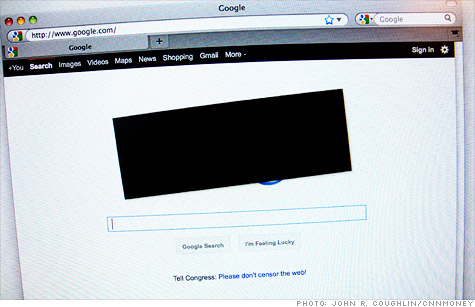Search News

Websites blackout in protest of Stop Online Piracy Act (SOPA).
NEW YORK (CNNMoney) -- Wikipedia was one of several websites that were shut down Wednesday in protest of anti-piracy bills before Congress that critics say could amount to censorship.
Instead of the usual encyclopedia articles, visitors to Wikipedia were greeted by a message about the decision to black out its English-language Web page for an entire day.
"Imagine a World Without Free Knowledge," a stark message in white letters on a black and gray background read.
"For over a decade, we have spent millions of hours building the largest encyclopedia in human history. Right now, the U.S. Congress is considering legislation that could fatally damage the free and open Internet. For 24 hours, to raise awareness, we are blacking out Wikipedia."
However, users were able to access Wikipedia on some smartphones.
The blog Boing Boing, also blacked out for the day, painted a more dire picture on its site.
"Boing Boing is offline today because the U.S. Senate is considering legislation that would certainly kill us forever. The legislation ... would put us in legal jeopardy if we linked to a site anywhere online that had any links to copyright infringement."
While not blacking out its home page, search giant Google (GOOG, Fortune 500) joined the cause by covering its famous logo with a black rectangle and urging visitors "Tell Congress: Please don't censor the web!"
The protest is in response to the Stop Online Piracy Act (SOPA) bill, a piece of proposed legislation that is working its way through the Congress. A Senate committee approved a similar bill in May called the Protect IP Act (PIPA) and is now pending before the full Senate.
Searches of the terms "SOPA" and "PIPA" on Wikipedia turned up articles on the subjects Wednesday, while other searches led to the blackout screen.
The controversial legislation has turned into an all-out war between Hollywood and Silicon Valley. Media companies have united in favor of it, while tech's power players are throwing their might into opposing it.
If SOPA passes, copyright holders would be able to complain to law enforcement officials and get websites shut down. Search engines and other providers would have to block rogue sites when ordered to do so by a judge. Sites could be punished for hosting pirated content -- and Internet companies are worried they could be held liable for users' actions.
As Boing Boing wrote: "Making one link would require checking millions (even tens of millions) of pages, just to be sure that we weren't in some way impinging on the ability of five Hollywood studios, four multinational record labels, and six global publishers to maximize their profits."
Google warned that the impact of such legislation would be far-reaching.
"YouTube would just go dark immediately," Google public policy director Bob Boorstin said at a conference last month. "It couldn't function."
SOPA's supporters -- including CNN parent company Time Warner (TWX, Fortune 500) and groups such as the Motion Picture Association of America -- say that online piracy leads to U.S. job losses because it deprives content creators of income.
The bill's supporters dismiss accusations of censorship, saying the legislation is meant to revamp a broken system that doesn't adequately prevent criminal behavior.
But SOPA critics say the bill's backers don't understand the Internet's architecture, and therefore don't appreciate the implications of the legislation they're considering.
"Within our community we're very strong defenders of copyright. We have very strict rules about obeying copyright and we don't link to materials that we know to be copyright infringement. That isn't really the issue," said Wikipedia co-founder Jimmy Wales. "The other side will try to paint this as anybody who's opposed to this must be making money off of piracy or be in favor of piracy. That isn't true. The issue here is that this law is very badly written, very broadly overreaching ..."
In November, tech behemoths such as Google and Facebook lodged a formal complaint letter to lawmakers, saying: "We support the bills' stated goals. Unfortunately, the bills as drafted would expose law-abiding U.S. Internet and technology companies to new uncertain liabilities (and) mandates that would require monitoring of websites."
And Washington has taken notice.
The growing Internet protest against the online anti-piracy bill moving through Congress is "daunting," a Senate Democratic aide said Tuesday.
The aide said the protest may be powerful enough to keep senators from voting to even take up the bill that until recently commanded rare bipartisan support.
"Before it looked like it would pass with 80 votes, and now (the online protest) looks like something that will suck the votes away," the aide said. "We're at a tipping point. It will either become a huge issue or die down a bit and that will determine the future of this."
The aide said it was premature to say exactly how it will play out but acknowledged that because of protest from Internet mainstays such as Google and Wikipedia "the merits of the bill are getting lost" and "sand is shifting pretty quickly" against it.
-- CNNMoney's Julianne Pepitone and Aaron Smith, and CNN's Ed Payne, John D. Sutter, Ted Barrett and Deirdre Walsh contributed to this report. ![]()